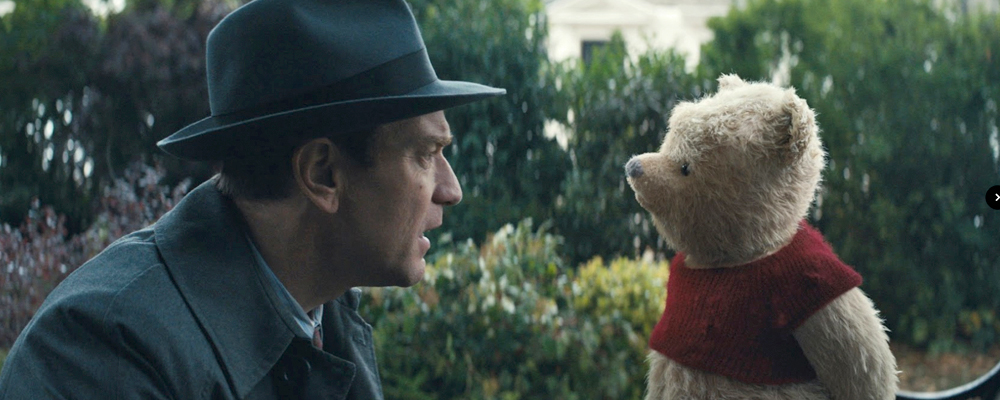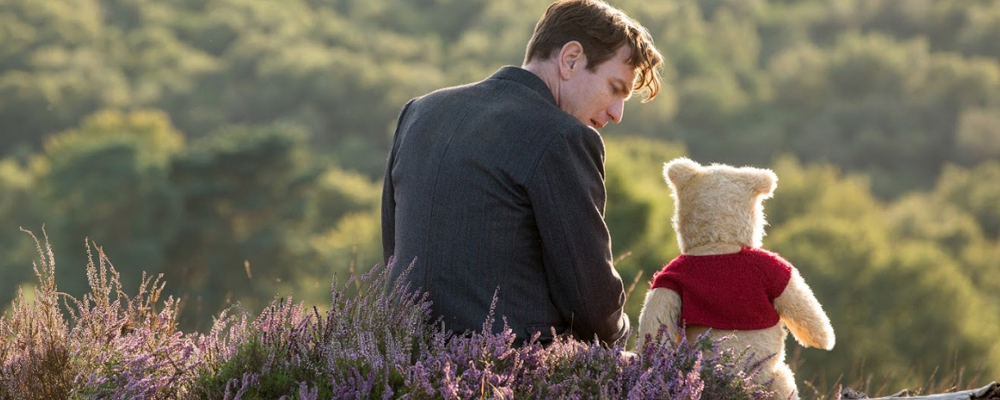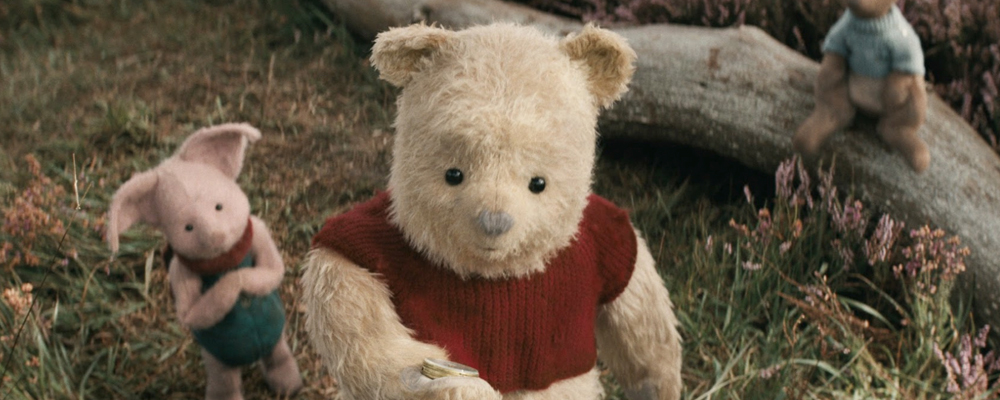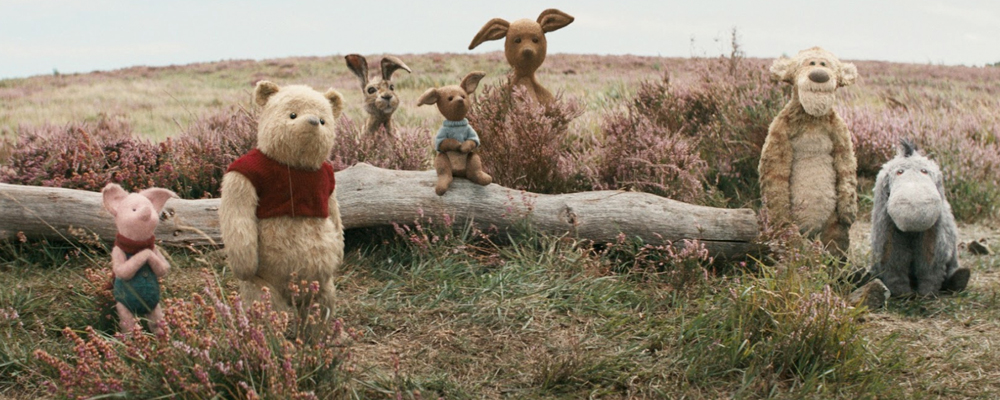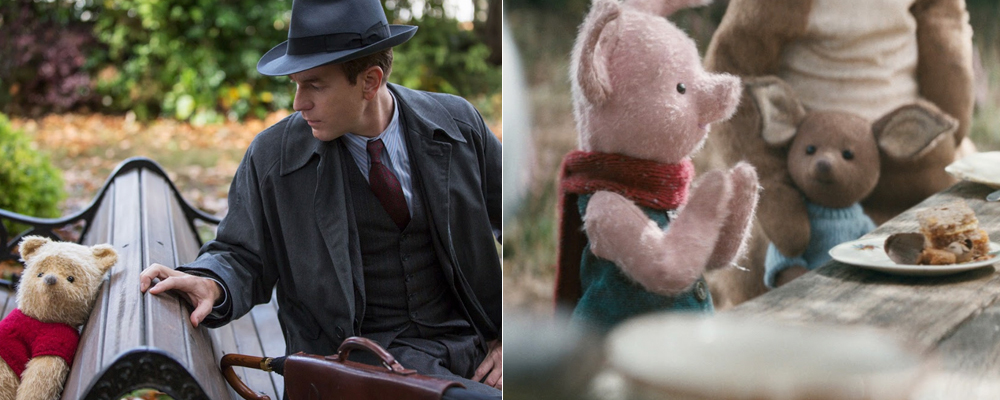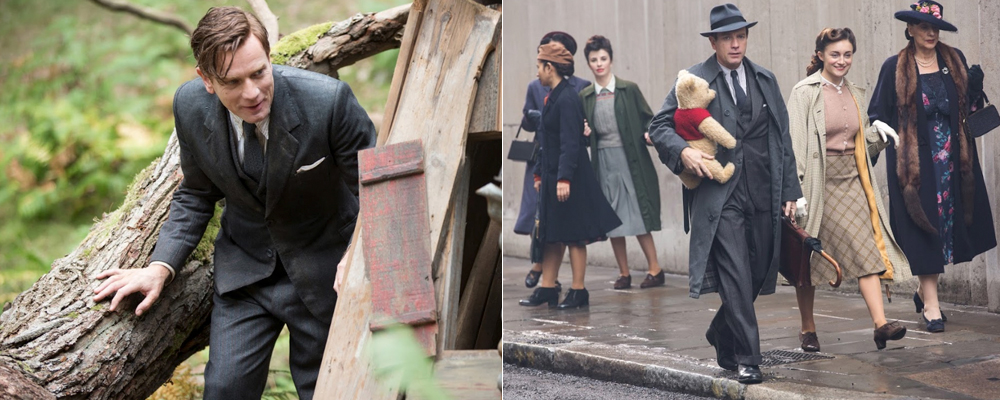Disney’s ‘Christopher Robin’ Finds Winnie the Pooh Facing Grown Up Realities
Alci Rengifo
Growing up is never fun, even in the world of Disney. “Christopher Robin” takes one of the sweetest of all Disney titles and transforms it into a rather melancholy, at times dreary parable about becoming a stressed out, anxiety-prone adult. Those who grew up with the original 1977 film, “The Many Adventures of Winnie the Pooh,” and its subsequent sequels, will find many of their favorite characters here, turned into live action CGI creations. It’s a rather mixed bag. This is a film that shifts from tenderness to outright despair, from sunny images to depressed grays. It can be endearing one moment, and depressing the next. Interestingly enough, the grown-ups might get more out of it.
Christopher Robin, the boy who lost himself in imagination and adventure in the Hundred Acre Wood, has left for boarding school, the battlegrounds of World War II and now returns as an overworked businessman played by Ewan McGregor. By now Christopher has lost his imaginative drive and has all but forgotten about Winnie and his other friends. His wife, Evelyn (Hayley Atwell), grows frustrated with Christopher’s distracted ways. The last straw is when he tells their daughter Madeline (Bronte Carmichael) that he will have to skip out on a trip to Essex. The reason? Christopher’s boss has tasked him with firing nearly half of the office staff. Now he has to spend the whole weekend making the painful decision of who gets the axe. Meanwhile in the Hundred Acre Wood, Winnie the Pooh (Jim Cummings) awakens to discover that his usual band of friends, Tigger (Cummings), Eeyore (Brad Garrett), Piglet (Nick Mohammed), Rabbit (Peter Capaldi) and Owl (Toby Jones) are missing. Confused and with a rumbly tummy, Pooh crosses over into London to find Christopher Robin. But the bear is not cheerfully welcomed and Christopher at first sees him as an annoying distraction. Yet somehow he is lured back into Hundred Acre, to help Pooh find the others and reconnect with his childhood self.
The odd style of “Christopher Robin” might have something to do with the choice of director, Mark Forster. Forster is not exactly known for cuddly movies, with credits that include “World War Z,” “Monster’s Ball,” “Machine Gun Preacher” and “All I See Is You,” which have ratings blocking them from the intended audience for “Christopher Robin.” The movie’s look feels like a combination of classic Disney dreaminess with a starker, British drama feel. Forster shoots most of the film in cold greys, with a lot of shadows. Even the Hundred Acre Wood looks eerie when we first see Pooh get out of bed, venturing out and realizing everyone is missing.
The tone is that of a family movie, but the premise is devoid of cheer for most of the first two acts. We’re essentially treated to a drama about a stressed businessman tasked with firing people, with office scenes featuring dialogue about percentages and figures sure to snooze some of the kids in the theater. As played by McGregor, Christopher Robin has become so jaded, that when a snuggly talking bear appears in his kitchen he barely feigns shock, he just tries to drag Pooh out and send him packing back home. Of course because it’s Disney there’s still that twinkle to the music and slapstick humor to soften the blows. The folksy, storybook feel of the previous “Winnie the Pooh” movies is gone here, replaced by a standard entertainment less shallow than the recent “Peter Rabbit,” but lacking in the tenderhearted wisdom of the originals. Released from the fantastical world of animation, Pooh and the gang are now part of cold reality. To be fair there are some very entertaining, at times sweet moments that utilize the live action process well. A scene where Christopher carries Pooh through busy London is almost like a funny self-parody, as someone notices the talking bear and walks into a pole, or when a women catches Christopher talking to Pooh in a phone booth. At a busy train station Pooh asks for a balloon which Christopher, annoyed, gets for him for losing him amid the crowds. These scenes are aided a lot by Jim Cummings’s performance as Pooh, which is interesting because he conveys warmth, innocence and friendship while surrounded by a sad visual palette.
The other standout voice performance is Brad Garrett as the eternally depressed stuffed donkey Eeyore. Garrett is hilarious and endearing pessimism. Christopher finds him floating down a river, as Eeyore simply states, “it’s all over now.” He grabs his old friend and Eeyore can only reply, “it’s kind of you to kidnap me.” In fact we wish Forster would have added more of the actual Hundred Acre Wood world into the movie. Like the Tim Burton “Alice In Wonderland” from a few years ago, the recognizable characters are thrown around almost as cameos for an autopilot plot. Piglet runs around with his nerves crashing, but we barely see much of him or Owl. Even Kanga barely makes an appearance is downright easy to miss. Cummings does double duty as Tigger and perfectly captures the bouncy, jolly feline. It’s the voices that shine because as CGI creatures these characters lose a lot of the inviting, memorable features that made them adorable and loved by generations. One nice moment involves Pooh hugging Christopher Robin out of fear of the imagined monsters prowling the woods, but take off the sound and it’s obvious the moment works because of Cummings, not because of anything captured by the digital animation. The same goes for moments when Pooh complains about his rumbling tummy and dips into a pot of honey.
When the story’s great challenge arrives it all boils down to Christopher Robin’s office paperwork being left behind at Hundred Acre, so Pooh and the gang need to venture to London to give him his papers lest he be fired. Everyone is reduced to doing the usual gags like racing through the streets, tumbling down a hill. It’s not exactly terrible, but not the most imaginative storytelling device that could have been used here. You almost wonder why this route was chosen over a remake in the style of the recent “Beauty and the Beast” or “The Jungle Book.” “Christopher Robin” will surely find an audience, because these characters are cultural staples. But what used to be a wonderful set of stories is reduced to just a mere Friday night time killer. The lesson is apparently not to turn into a boring, mean adult, and maybe that’s not such a bad goal, but it should not have been the only one.
“Christopher Robin” releases August 3 in theaters nationwide.

